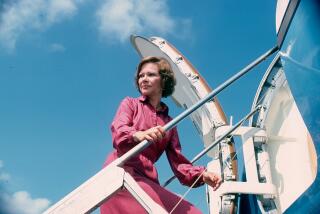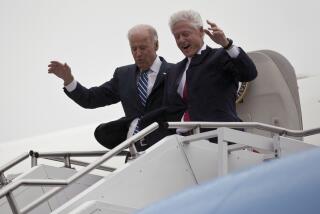Sheehy’s ‘Choice’: to Dissect the First Marriage
- Share via
NEW YORK — Late on a Friday night, Sen. Hillary Rodham Clinton (D-N.Y.) returns to her suburban Westchester County home, following a last-minute flurry of Senate business and a quick shuttle flight back from Washington, D.C., to New York.
She’s tired but doesn’t have time to rest: She is working the rubber chicken circuit this weekend, and Bill Clinton will be accompanying her to several political events. Come Monday, he stays home and she’s back on the shuttle.
What’s wrong with this picture?
For some, the idea that Hillary Clinton will be elected to the Senate in the fall seems questionable, given a rash of blunders in her early campaign. But for Gail Sheehy, the bestselling author of the recently published “Hillary’s Choice” (Random House), the notion of Bill Clinton taking a back seat to his wife’s political ambitions--and of her agreeing to live with him after their White House years end--is equally dubious.
“There’s a negotiation going on now between them, and the price of her recommitting to this marriage is that Bill Clinton comes to New York and acts as her No. 2, as she has done for him all these years,” says Sheehy, speaking via car phone, as she races from one media interview to the next.
“But the problem is that he’s resisting. I cannot imagine Bill Clinton sitting in a suburban den waiting for Sen. Clinton to get back from Washington, and trooping around after her on weekends,” she continues. “It sounds like hell to me, and yet this is something she is absolutely insisting on.”
By her own admission, Sheehy has not had a full-blown interview with Hillary Clinton since 1992, and given the heated White House attack on her new biography--aides have denounced it as a mean-spirited, inaccurate account--some readers might be forgiven for wondering how the author can claim to have such inside knowledge of the first couple.
“I have a pretty solid reputation as a reporter and writer over 30 years,” says Sheehy, whose “Passages” became a mega-seller in 1976. “And I’ve talked to hundreds of people and sources in the preparation of this book, people in a position to know something substantial about the Clintons.”
Profile Reporting
With a Twist
Some of these sources are identified; others are not. But Sheehy’s telling of life stories has long taken her beyond conventional reporting techniques. In previous works, she has explored America’s inner life and generational angst through a highly specialized lens--and the Clintons are simply the latest subjects to come under her microscope.
Sheehy, 62, is no stranger to celebrity lifestyles. As a political journalist and Vanity Fair contributing editor, she’s profiled Newt Gingrich, Mikhail Gorbachev, George Bush, Margaret Thatcher, Bob and Elizabeth Dole and Gary Hart. An original contributor to New York magazine, she studied anthropology at Columbia University under Margaret Mead, whom she considered an intellectual mentor.
The mother of two daughters, Sheehy is married to former magazine editor Clay Felker, and divides her time between homes in New York and the Bay Area. During the last 20 years, she has pioneered a blend of pop psychology and “personality” reporting that is now commonplace. Her most acclaimed remains “Passages,” a runaway bestseller that traced how people change as they age, but the author has stirred controversy with her most recent portrayals of the Clintons as an ambitious boomer couple showing signs of age.
As Bill leaves the White House and Hillary embarks on a new political career, for example, they’re not just experiencing friction; Sheehy calls it Couple Crossover. In her parlance, the president’s sexual peccadilloes are not only a moral lapse, but a “Disassociative Identities” problem. Hillary Clinton’s bid for a New York Senate seat is a midlife Quest for Redemption.
“She was chafing at the bit through impeachment, because she still had to wait for Bill Clinton, as she’s waited for the last quarter century,” the author says. “And she began sitting down with Harold Ickes [a chief campaign aide] minutes after the final Senate vote, to chart her own future.
“Hillary wants to redeem the ambition she’s suppressed on Bill’s behalf for all these years,” Sheehy adds. “She wants to redeem herself from the failure of her health care plan. And she wants to finally speak out with her own voice.”
Much of this has been said before, and as columnist Gail Collins wrote in a New York Times review of “Hillary’s Choice,” Sheehy’s latest offers more insight into the meaning of the public’s Clinton Fatigue than anything else. Still, the 389-page book provides tantalizing speculation as to what may lie ahead.
The Nuances of
a Famous Marriage
Presidents have typically gone into a funk when they leave the White House, the author notes, and Bill Clinton may be heading for a particularly severe letdown. Will he have problems with his new life after politics? “I think he’ll drive off that bridge when he comes to it,” Sheehy cracks.
The first couple are likely to lead “parallel but separate lives” she adds, but it is difficult to say with any certainty whether they will actually divorce. Despite the humiliation and shame that Hillary Clinton has experienced, Sheehy suggests there is something in the DNA of her relationship with Bill that prevents them from splitting up.
In a telling anecdote, Sheehy describes a comment the president made last summer; he had been discussing political issues with his wife until late in the evening and suddenly asked if she was still interested in pursuing their conversation. “You’re a lot of things, Bill Clinton,” he recalled his wife saying, “but you’re not boring.”
This morsel, according to the author, suggests that “Bill and Hillary are one another’s missing piece. The reason they may not break up is they’ve been around this track many times, fighting and making up and screaming and smooching. They were doing this within minutes from the first time they met.”
As biography, “Hillary’s Choice” breaks intriguing new ground, particularly in the discussion of Hillary’s hot college romance with David Rupert, a Georgetown government major whom she met as a Washington, D.C., intern in the summer of 1968.
The two had a “tempestuous” relationship, and the account includes Rupert’s now-famous suggestion (between the lines) that Hillary inhaled. Sheehy also quotes from unpublished letters that Hillary wrote to her friends, describing a highly intelligent woman who hungered for public service.
But “Hillary’s Choice” has run afoul of several critics on key points. Hillary’s Senate campaign spokesman, Howard Wolfson, said Sheehy erred in writing that Hillary’s father did not attend her Wellesley graduation ceremony at which she spoke.
Meanwhile, in a scathing Village Voice review, media critic Cynthia Cotts noted that historian Gary Willis has protested that one of his quotes about Hillary was twisted by Sheehy. The most significant attack, however, has dredged up an old and bitter clash between Sheehy and Hillary Clinton, growing out of the Clintons’ 1992 presidential primary campaign.
Sheehy got an interview with Hillary as part of a Vanity Fair profile, fresh on the heels of the Gennifer Flowers uproar. The journalist set off fireworks with a quote in which Hillary referred tartly to a woman who had allegedly been linked romantically with then-President George Bush.
The Bush campaign denounced the story, and Hillary also protested. She claimed the quote was a garbled comment taken from a private conversation that should not have been printed; critics claim this incident is the reason why the first lady did not cooperate with Sheehy this time around.
For her part, the author insists the Bush quote was accurate and on the record. Her article was vetted by Tina Brown, then-editor of Vanity Fair, she says, adding that the continuing flap illustrates one of Hillary’s basic flaws:
“She has to be perfect; it was that way with her grades, when she was growing up, and it’s that way now, because she cannot stand it when anybody exposes any of her flaws, foibles or insecurities,” Sheehy says. “That’s why people have trouble sensing her as human or truly connecting with her.”
It’s already a problem in her Senate campaign, the author suggests, because voters are grumbling about her carpetbagger status, despite the Clintons’ much-publicized purchase of a home in tony Chappaqua, north of Manhattan.
“She hasn’t done anything normal in New York yet,” Sheehy says. “She hasn’t gone shopping at Bloomingdale’s or to a Yankees game. She hasn’t let cameras follow her around when she visits her new house, trying to figure out where the sofa will go, or something else that people do when they move.”
Despite these flaws, the author adds, no one should sell Hillary Clinton short. Her probable opponent, New York City’s GOP Mayor Rudolph Giuliani, is known for his combative style, “but this is going to be a campaign between a bullier [Hillary] and a bully. . . . She’s a fighter who used to pick battles with her husband’s opponents. She’ll hold her own.”
Yet the key question, Sheehy suggests, is how the first lady will come to terms with the conflicts still raging inside her about marriage, family and career. Her still-evolving legacy as first lady hinges on choices she has yet to make.
As Hillary herself wrote, in a poignant 1968 letter to a childhood friend: “I wonder who is me. I wonder if I’ll ever meet her. If I did, I think we’d get along famously.”
More to Read
Sign up for our Book Club newsletter
Get the latest news, events and more from the Los Angeles Times Book Club, and help us get L.A. reading and talking.
You may occasionally receive promotional content from the Los Angeles Times.










